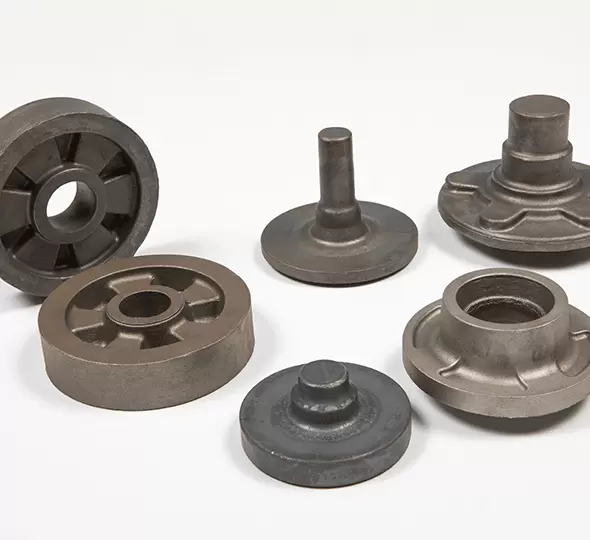New Energy Vehicle Steel Forging: The Backbone of Modern Electric Vehicle Manufacturing
2024-12-24
The advancement of new energy vehicles (NEVs) has revolutionized the automotive industry, introducing unprecedented requirements for strength, precision, and efficiency in component manufacturing. At the heart of this transformation is new energy vehicle steel forging, a process that ensures the production of durable, lightweight, and reliable components tailored to the specific needs of electric and hybrid vehicles. This article Longteng explores the significance of new energy vehicle steel forging in modern manufacturing.
What Is New Energy Vehicle Steel Forging?

Steel forging is a manufacturing process where steel is shaped using localized compressive forces, often involving hammers, presses, or dies. This process significantly improves the material's internal structure, resulting in components with enhanced strength, durability, and resistance to stress. In the automotive industry, new energy vehicle steel forging has become a crucial technology for meeting the high-performance requirements of modern electric and hybrid vehicles.
For new energy vehicles, steel forging serves as a cornerstone technology, enabling the production of lightweight, high-strength components that can withstand the mechanical stresses associated with electric powertrains, battery systems, and other critical subsystems. The forging process ensures that these components achieve optimal weight reduction and deliver the exceptional durability and mechanical properties needed for long-term reliability.
By leveraging new energy vehicle steel forging, manufacturers can create high-performance parts tailored to the unique challenges of NEVs, such as high torque loads, thermal stresses, and vibrations. This makes forged steel indispensable in ensuring the structural integrity and functional efficiency of key components, including drivetrain parts, suspension systems, and chassis elements.
In essence, new energy vehicle steel forging is the backbone of structural and functional components in electric and hybrid vehicles. It provides the strength, precision, and versatility required to address the challenges of modern automotive engineering while supporting the industry's goals for sustainability and innovation.
The Significance of New Energy Vehicle Steel Forging in Modern Manufacturing
Steel forging is a vital manufacturing process that utilizes compressive forces to shape steel into components with exceptional mechanical properties. As the world transitions towards sustainable transportation, new energy vehicle steel forging has emerged as a key enabler in addressing the unique challenges posed by electric drivetrains, battery systems, and the lightweight construction requirements of these vehicles.
Meeting the Demands of New Energy Vehicles
New energy vehicles (NEVs) demand components that are both lightweight and highly durable to achieve optimal energy efficiency and extended range. Unlike traditional internal combustion engine (ICE) vehicles, NEVs face a completely different set of challenges. The heavy battery systems of NEVs require vehicle manufacturers to offset the weight through lightweight yet robust materials for structural components. Moreover, electric drivetrains generate unique stresses, including high torque, heat, and vibration, which necessitate parts with superior strength and durability.
Conventional manufacturing methods, such as casting or machining, often struggle to meet these demanding requirements without compromises in performance, durability, or cost. This is where new energy vehicle steel forging becomes a game-changer. By providing the perfect combination of strength, precision, and weight reduction, steel forging ensures that NEVs can meet stringent performance and safety standards while remaining cost-effective for mass production.
Why Steel Forging Stands Out
New energy vehicle steel forging offers unparalleled advantages for manufacturing components critical to the operation and safety of NEVs. One of the primary benefits is how the forging process aligns the steel's internal grain structure along the geometry of the component. This grain alignment significantly improves the mechanical properties of the material, such as tensile strength, fatigue resistance, and impact toughness. As a result, forged steel parts are more reliable and durable, making them ideal for applications in NEVs where long-term performance is crucial.
For instance, new energy vehicle steel forging is frequently used to produce key components like suspension systems, drivetrain elements, and structural reinforcements. These components must withstand intense loads, high-frequency vibrations, and temperature variations caused by the vehicle's operation. The forging process ensures these parts can handle these stresses while remaining lightweight—a critical factor for improving vehicle range and efficiency.
Additionally, steel forging provides superior dimensional accuracy and surface quality compared to other manufacturing methods. This precision minimizes the need for extensive secondary machining, reducing production costs and lead times. For NEVs, where innovation and cost-efficiency are paramount, this makes steel forging the preferred choice for manufacturers.
Forging the Future of NEV Manufacturing
As the demand for electric vehicles continues to rise, new energy vehicle steel forging will play an increasingly significant role in shaping the industry. The ability to produce high-performance, lightweight components at scale aligns perfectly with the sustainability goals of the automotive sector. Steel forging not only ensures optimal performance but also supports the push towards more environmentally friendly manufacturing practices by reducing material waste and energy consumption.
Moreover, advancements in forging technology, such as precision forging and hybrid material applications, further enhance the capabilities of forged components in NEVs. For example, combining forged steel with advanced coatings or integrating it with lightweight alloys can result in components that push the boundaries of strength-to-weight ratios even further. These innovations are key to addressing future challenges, such as extending vehicle range and improving battery efficiency, while maintaining the safety and reliability of NEVs.
As the automotive industry continues its transition toward sustainable transportation, new energy vehicle steel forging remains a cornerstone of innovation. This manufacturing process enables the production of high-performance components that meet the demanding requirements of NEVs, ensuring safety, efficiency, and reliability. From structural parts to precision motor components, forged steel plays a vital role in defining the performance and success of new energy vehicles. With its unmatched combination of strength, versatility, and cost-effectiveness, steel forging is not just a manufacturing process—it is the foundation upon which the future of electric and hybrid vehicles is built.





















 Email
Email